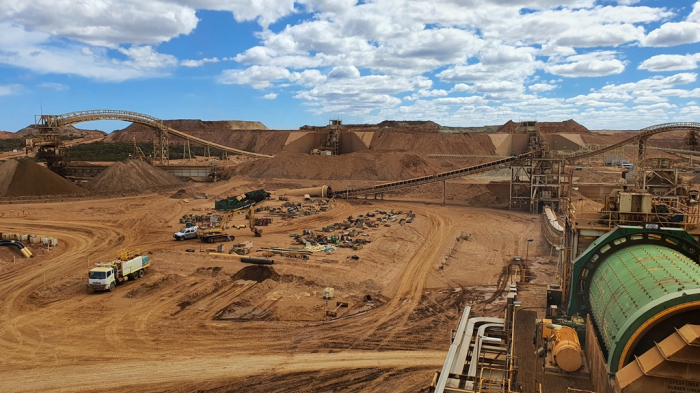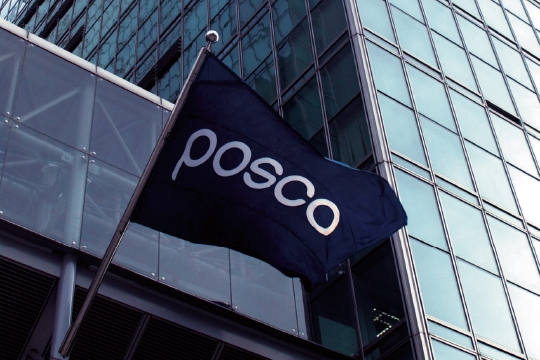Battery materials
POSCO to build $200 mn nickel refining plant to ramp up battery materials
The move is part of the steel giant’s long-term goal to become the world's top battery material player by 2030
By Jul 28, 2021 (Gmt+09:00)
1
Min read
Most Read
LG Chem to sell water filter business to Glenwood PE for $692 million


Kyobo Life poised to buy Japan’s SBI Group-owned savings bank


KT&G eyes overseas M&A after rejecting activist fund's offer


StockX in merger talks with Naver’s online reseller Kream


Mirae Asset to be named Korea Post’s core real estate fund operator



POSCO, the world’s fifth-largest steelmaker by output, said on Wednesday it is spending 230 billion won ($200 million) to build a nickel sulfate refining facility to meet the growing demand for electric vehicle batteries.
The top South Korean steelmaker said it is building the plant in Gwangyang, South Jeolla Province, where its affiliate SNNC Co. is located. SNNC is a company that manufactures ferronickel, the main component of stainless steel and other steel by-products.
At the new factory to be constructed by 2023, POSCO plans to produce high-purity nickel with a nickel content of over 99.9% for use in EV batteries.
Once completed, the nickel refining facility will have an annual production capacity of 20,000 tons, enough for 500,000 electric cars, according to POSCO.
The move is part of POSCO’s long-term goal to become the world’s top player in the EV battery materials market by 2030, by establishing a supply chain from raw materials procurement to production of battery materials.

AGGRESSIVE ACQUISITIONS
The steelmaker in May signed a 270 billion won ($240 million) deal to acquire a 30% stake in the Ravensthorpe Nickel Operation in Australia. Under the deal, POSCO will be receiving 7,500 tons a year of mixed nickel-cobalt hydroxide precipitate (MHP) produced at Ravensthorpe from 2024.
Nickel and cobalt are two key raw materials used to produce cathodes and anodes used in lithium-ion batteries.
Last month, POSCO, which is aggressively expanding its battery materials business, also jointly invested a combined 17 billion won with Korea’s LG Energy Solution Ltd. in Australia's Queensland Pacific Metals Ltd. (QPM) for stable procurement of nickel and cobalt.
By 2030, POSCO aims to produce 220,000 tons of lithium and 100,000 tons of nickel to establish a system for the production of 400,000 tons of cathodes and 260,000 tons of anodes.
“If we secure the production capacity, we’ll be able to generate 23 trillion won in annual sales from the battery material business with a 20% share of the global market,” said a POSCO official.
Cathodes take up around 40% of the manufacturing cost of EV batteries.
Write to Jung-hwan Hwang at jung@hankyung.com
In-Soo Nam edited this article.
More to Read
-
 Battery materialsPOSCO Chemical to bolster EV presence with 60,000-ton cathode plant
Battery materialsPOSCO Chemical to bolster EV presence with 60,000-ton cathode plantJul 08, 2021 (Gmt+09:00)
1 Min read -
 Battery materialsPosco Chemical to supply EV battery materials to GM-LG Energy JV
Battery materialsPosco Chemical to supply EV battery materials to GM-LG Energy JVApr 05, 2021 (Gmt+09:00)
2 Min read -
 EV battery materialsPOSCO's lithium reserves in Argentina soar to $31 bn
EV battery materialsPOSCO's lithium reserves in Argentina soar to $31 bnMar 04, 2021 (Gmt+09:00)
2 Min read -
 Battery materialsPOSCO aims for top spot in EV battery materials market
Battery materialsPOSCO aims for top spot in EV battery materials marketDec 03, 2020 (Gmt+09:00)
2 Min read
Comment 0
LOG IN


